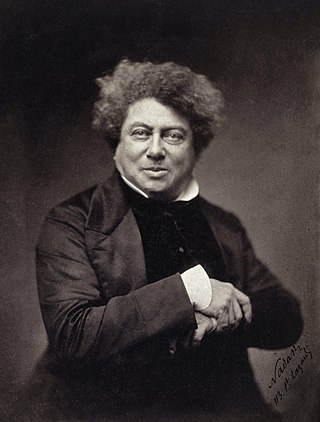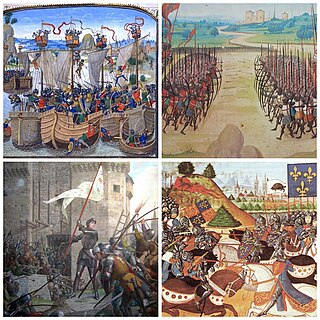Related Research Articles

French is a Romance language of the Indo-European family. Like all other Romance languages, it descended from the Vulgar Latin of the Roman Empire. French evolved from Gallo-Romance, the Latin spoken in Gaul, and more specifically in Northern Gaul. Its closest relatives are the other langues d'oïl—languages historically spoken in northern France and in southern Belgium, which French (Francien) largely supplanted. French was also influenced by native Celtic languages of Northern Roman Gaul like Gallia Belgica and by the (Germanic) Frankish language of the post-Roman Frankish invaders. Today, owing to the French colonial empire, there are numerous French-based creole languages, most notably Haitian Creole. A French-speaking person or nation may be referred to as Francophone in both English and French.

The French Revolution was a period of political and societal change in France that began with the Estates General of 1789, and ended with the coup of 18 Brumaire in November 1799 and the formation of the French Consulate. Many of its ideas are considered fundamental principles of liberal democracy, while its values and institutions remain central to modern French political discourse.

Louis XIV, also known as Louis the Great or the Sun King, was King of France from 1643 until his death in 1715. His verified reign of 72 years and 110 days is the longest of any sovereign. An emblematic character of the Age of Absolutism in Europe, Louis XIV's legacy is widely characterized by French colonial expansion, the conclusion of Eighty Years' War involving the Habsburgs, and his architectural bequest, marked by commissioned works of art and buildings. His pageantry, opulent lifestyle and ornate cultivated image earned him enduring admiration. Louis XIV raised France to be the exemplar nation-state of the early modern period, and established a cultural prestige which lasted through the subsequent centuries until today.

Monaco, officially the Principality of Monaco, is a sovereign city-state and microstate on the French Riviera a few kilometres west of the Italian region of Liguria, in Western Europe, on the Mediterranean Sea. It is a semi-enclave bordered by France to the north, east and west. The principality is home to 38,682 residents, of whom 9,486 are Monégasque nationals; it is recognised as one of the wealthiest and most expensive places in the world. The official language is French; Monégasque, English and Italian are spoken and understood by many residents.

Paris is the capital and largest city of France. With an official estimated population of 2,102,650 residents in January 2023 in an area of more than 105 km2 (41 sq mi), Paris is the fourth-largest city in the European Union and the 30th most densely populated city in the world in 2022. Since the 17th century, Paris has been one of the world's major centres of finance, diplomacy, commerce, culture, fashion, and gastronomy. For its leading role in the arts and sciences, as well as its early and extensive system of street lighting, in the 19th century, it became known as the City of Light.

Marie Antoinette was the last Queen of France prior to the French Revolution and the French First Republic. Marie Antoinette was the wife of Louis XVI. Born Archduchess Maria Antonia of Austria, she was the penultimate child and youngest daughter of Empress Maria Theresa and Emperor Francis I. She married Louis XVI, Dauphin of France, in May 1770 at age 14. She then became the Dauphine of France. On 10 May 1774, her husband ascended the throne as Louis XVI and she became queen.

The Napoleonic Wars (1803–1815) were a series of conflicts fought between the First French Empire under Napoleon Bonaparte (1804–1815) and a fluctuating array of European coalitions. The wars originated in political forces arising from the French Revolution (1789–1799) and from the French Revolutionary Wars (1792–1802) and produced a period of French domination over Continental Europe. The wars are categorised as seven conflicts, five named after the coalitions that fought Napoleon, plus two named for their respective theatres: the War of the Third Coalition, War of the Fourth Coalition, War of the Fifth Coalition, War of the Sixth Coalition, War of the Seventh Coalition, the Peninsular War, and the French invasion of Russia.

Charles André Joseph Marie de Gaulle was a French military officer and statesman who led the Free French Forces against Nazi Germany in World War II and chaired the Provisional Government of the French Republic from 1944 to 1946 to restore democracy in France. In 1958, amid the Algerian War, he came out of retirement when appointed Prime Minister by President René Coty. He rewrote the Constitution of France and founded the Fifth Republic after approval by referendum. He was elected President of France later that year, a position he held until his resignation in 1969.

Louis XVI was the last king of France before the fall of the monarchy during the French Revolution.

Ivory Coast, also known as Côte d'Ivoire and officially the Republic of Côte d'Ivoire, is a country on the southern coast of West Africa. Its capital city of Yamoussoukro is located in the centre of the country, while its largest city and economic centre is the port city of Abidjan. It borders Guinea to the northwest, Liberia to the west, Mali to the northwest, Burkina Faso to the northeast, Ghana to the east, and the Atlantic Ocean's Gulf of Guinea to the south. With 30.9 million inhabitants in 2023, Ivory Coast is the third-most populous country in West Africa. Its official language is French, and indigenous languages are also widely used, including Bété, Baoulé, Dyula, Dan, Anyin, and Cebaara Senufo. In total, there are around 78 different languages spoken in Ivory Coast. The country has a religiously diverse population, including numerous followers of Islam, Christianity, and traditional faiths often entailing animism.

Napoleon III was the first president of France from 1848 to 1852, and the last monarch of France as the second Emperor of the French from 1852 until he was deposed on 4 September 1870.

Napoleon Bonaparte, later known by his regnal name Napoleon I, was a French military officer and statesman who rose to prominence during the French Revolution and led a series of successful campaigns across Europe during the French Revolutionary and Napoleonic Wars from 1796 to 1815. He was the leader of the French Republic as First Consul from 1799 to 1804, then of the French Empire as Emperor of the French from 1804 to 1814, and briefly again in 1815.

Alexandre Dumas, also known as Alexandre Dumas père, was a French novelist and playwright.

The France national football team represents France in men's international football. It is controlled by the French Football Federation, the governing body for football in France. It is a member of UEFA in Europe and FIFA in global competitions. The team's colours and imagery reference two national symbols: the French blue-white-red tricolour and Gallic rooster. The team is colloquially known as Les Bleus. They play home matches at the Stade de France in Saint-Denis and train at Centre National du Football in Clairefontaine-en-Yvelines.

France, officially the French Republic, is a country located primarily in Western Europe. Its overseas regions and territories include French Guiana in South America, Saint Pierre and Miquelon in the North Atlantic, the French West Indies, and many islands in Oceania and the Indian Ocean, giving it one of the largest discontiguous exclusive economic zones in the world. Metropolitan France shares borders with Belgium and Luxembourg to the north, Germany to the northeast, Switzerland to the east, Italy and Monaco to the southeast, Andorra and Spain to the south, and a maritime border with the United Kingdom to the northwest. Its metropolitan area extends from the Rhine to the Atlantic Ocean and from the Mediterranean Sea to the English Channel and the North Sea. Its eighteen integral regions span a combined area of 643,801 km2 (248,573 sq mi) and have a total population of 68.4 million as of January 2024. France is a semi-presidential republic with its capital in Paris, the country's largest city and main cultural and commercial centre.

The Hundred Years' War was a conflict between the kingdoms of England and France and a civil war in France during the Late Middle Ages. It emerged from feudal disputes over the Duchy of Aquitaine and was triggered by a claim to the French throne made by Edward III of England. The war grew into a broader military, economic, and political struggle involving factions from across Western Europe, fuelled by emerging nationalism on both sides. The periodisation of the war typically charts it as taking place over 116 years. However, it was an intermittent conflict which was frequently interrupted by external factors, such as the Black Death, and several years of truces.

The Seven Years' War (1756–1763) was a global conflict involving most of the European great powers, fought primarily in Europe and the Americas. One of the opposing alliances was led by Great Britain and Prussia. The other alliance was led by France and Austria, backed by Spain, Saxony, Sweden, and Russia. Related conflicts include the 1754 to 1763 French and Indian War, and 1762 to 1763 Anglo-Spanish War.

Vichy France, officially the French State, was the French rump state headed by Marshal Philippe Pétain during World War II. It was named after its seat of government, the city of Vichy. Officially independent, but with half of its territory occupied under the harsh terms of the 1940 armistice with Nazi Germany, it adopted a policy of collaboration. Though Paris was nominally its capital, the government established itself in the resort town of Vichy in the unoccupied "free zone", where it remained responsible for the civil administration of France as well as its colonies. The occupation of France by Nazi Germany at first affected only the northern and western portions of the country, but in November 1942 the Germans and Italians occupied the remainder of Metropolitan France, ending any pretence of independence by the Vichy government.

French Guiana is an overseas department and region of France located on the northern coast of South America in the Guianas and the West Indies. Bordered by Suriname to the west and Brazil to the east and south, French Guiana covers a total area of 84,000 km2 (32,000 sq mi) and a land area of 83,534 km2 (32,253 sq mi).As of January 2024, it is home to approximately 295,385 people.

Emmanuel Jean-Michel Frédéric Macron is a French politician who has been the 25th and current president of France since 2017 and ex officio one of the two co-princes of Andorra. He previously was Minister of Economics, Industry and Digital Affairs under President François Hollande from 2014 to 2016 and Deputy Secretary-General to the President from 2012 to 2014. He has been a member of Renaissance since he founded it in 2016.
References
- ↑ Dolf Sternberger, Bernhard Vogel, Dieter Nohlen & Klaus Landfried (1978) Die Wahl der Parlamente: Band II: Afrika, Erster Halbband, p711